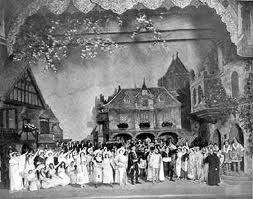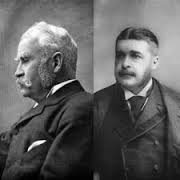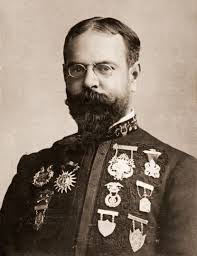Long before Jerome Kern, George Gershwin, Irving Berlin, or Richard Rodgers composed a single musical phrase for a Broadway show, and light years before Stephen Schwartz, Stephen Sondheim, and Fred Kander, and many others, there were numerous native composers writing for the Broadway and American stage. They were not writing the types of musicals that we are so familiar with from the 1920s through to the present, nor did they create the kind if songs we associate with present day Broadway. They were writing operetta, a form that was made popular by Gilbert and Sullivan when their H.M.S. Pinafore first made it to the U.S. shores in 1879.
H.M.S. Pinafore
H.M.S. Pinafore took America by storm. There were numerous companies performing the show simultaneously in New York City, road companies crisscrossing the U.S., and burlesque and vaudeville versions of the operetta. Pinafore not only got Americans singing the praises and songs of Gilbert and Sullivan, it created a craze for English operetta that resulted in many American composers trying their hand at the art form. Those American songwriters created some of the country’s first indigenous musicals. They were a far cry from what would become known as American musical theatre, but they would influence later writers who did develop the American musical such as Kern, Rodgers, and others.
American Operetta Composers and Writers
There were hundreds of American composers who tried their hand at operetta and saw their works produced. Some were fairly successful, although it seemed as if none could quite capture the wit, vigor, and tuneful appeal that defined the works of Gilbert and Sullivan. In this article we consider three: each is noteworthy in his own right.
Reginald De Koven
Reginald De Koven, like his counterparts in the U.S. who created operettas, was classically trained. De Koven, who was imitative of Gilbert and Sullivan, created the first successful American operetta, Robin Hood. Robin Hood premiered in 1890, it was the second of approximately 20 light operas created by the composer, and it was his most successful.
Robin Hood toured the U.S. and played New York City for more than a decade as the hallmark show of light opera company The Bostonians. The show’s most famous tune, “Oh Promise Me,” is said by some to have been taken from another song of the time. Whatever the case may be, De Koven’s Robin Hood, with a libretto by Harry B. Smith, was one of the most popular musical works of the 19th century written for the American stage.
Victor Herbert
Like many operetta composers in the U.S., Herbert got his start writing for The Bostonians. The manager of the company and lead comedian, Henry Clay Barnabee, was determined to support the creation of American operetta; thus he gave many young creators a chance to develop and refine their works.
Herbert started composing operettas in 1894. His works for The Bostonians included The Serenade (1897) and The Fortune Teller (1898). Both were very successful. Long after The Bostonians vanished from the stage, Herbert continued to compose light operas, seeing some of his most successful works come to fruition in the first two decades of the 20th century. From that time period, his works include Babes in Toyland (1903), Mlle. Modiste (1905), Naughty Marietta (1910), Sweethearts (1913) and Eileen (1917).
Herbert’s style was connected more to European composers than to the types of works created by Gilbert and Sullivan. After operetta began to lose its appeal with American audiences, Herbert adapted and created music for shows more in the American vein.
John Phillip Sousa
Composer John Phillip Sousa is best know for his band compositions, including Stars and Stripes Forever, which is considered by many to be the most brilliant band composition ever created. But Sousa had aspirations to become an operetta composer and like the two other in this article, he got his start writing for The Bostonians.
However, his most successful operetta, El Capitan, was not made famous by The Bostonians, but, rather by DeWolf Hopper. Hopper, a popular operetta comedian, played in El Capitan for 112 performances at the old Broadway Theatre on 41st Street in New York. For the next four years, the light opera then toured throughout the U.S. and Canada. Ironically, it is the march, “El Capitan,” that became popular with bands and audiences; it may still be heard today. Sousa wrote 15 operettas in all, but had his greatest success composing band music.
What Was to Come
Operetta was borrowed from Europe and England. The music was definitely a result of classical training. And although composers such as Jerome Kern, Richard Rodgers, Cole Porter, and many others would still create tunes that had a feel and sound connected to operetta, they, and many others, such as Irving Berlin, George Gershwin, Fats Waller, and Eubie Blake, to name just a few, would incorporate popular American idioms, rhythms, chord progressions, and tempos to create a brazen, bold style that would rely less upon strings and more upon brass, reeds, and drums.
Blues, jazz, swing, spirituals, and other forms of American music would take Broadway audiences to a new place where operetta could never transport them. However, it was composers like De Koven, Herbert, and Sousa who helped to make the Broadway musical stage a place where American composers could create and develop their own voices. They broke new ground, creating a foundation for those who came after them.






